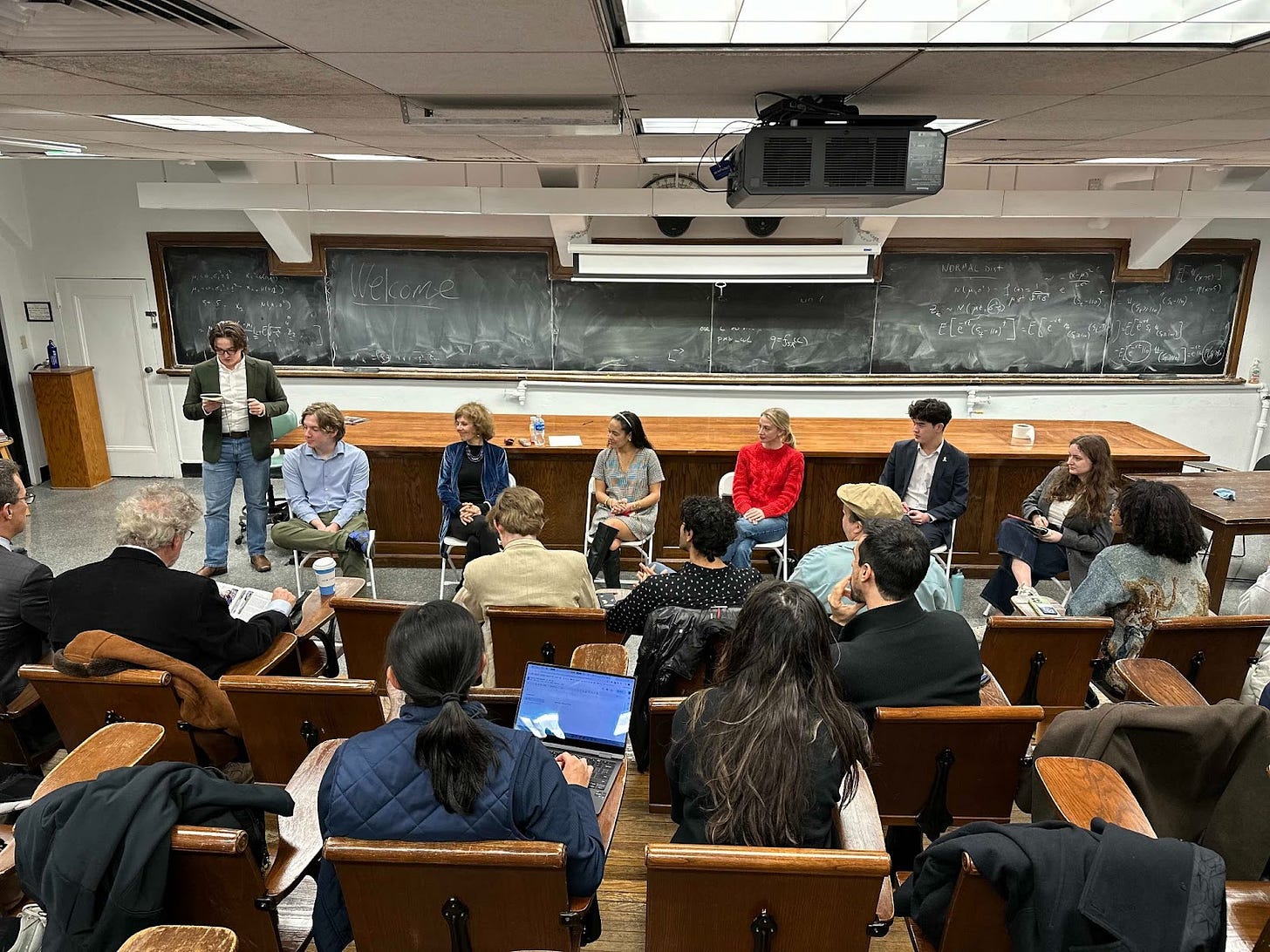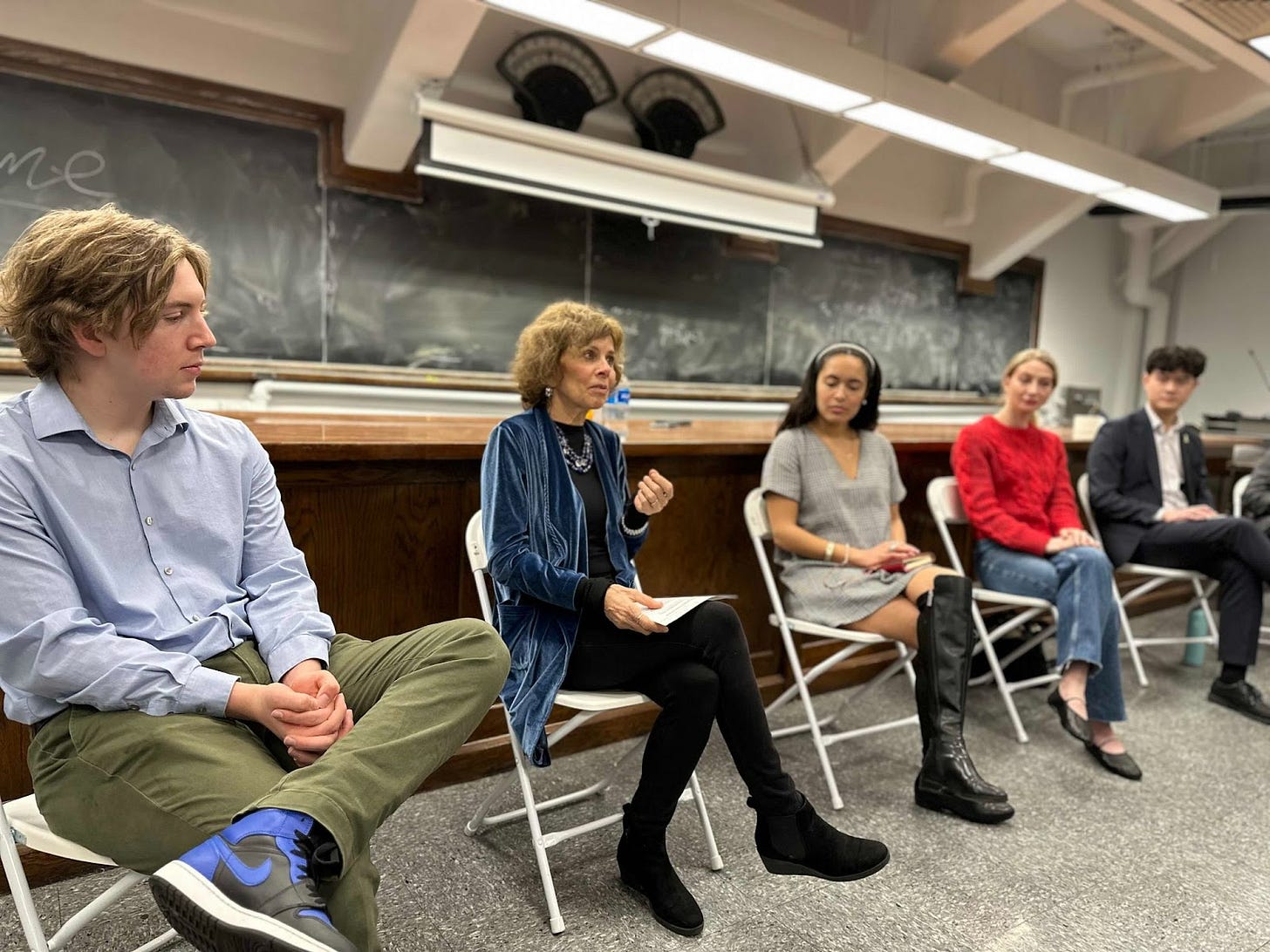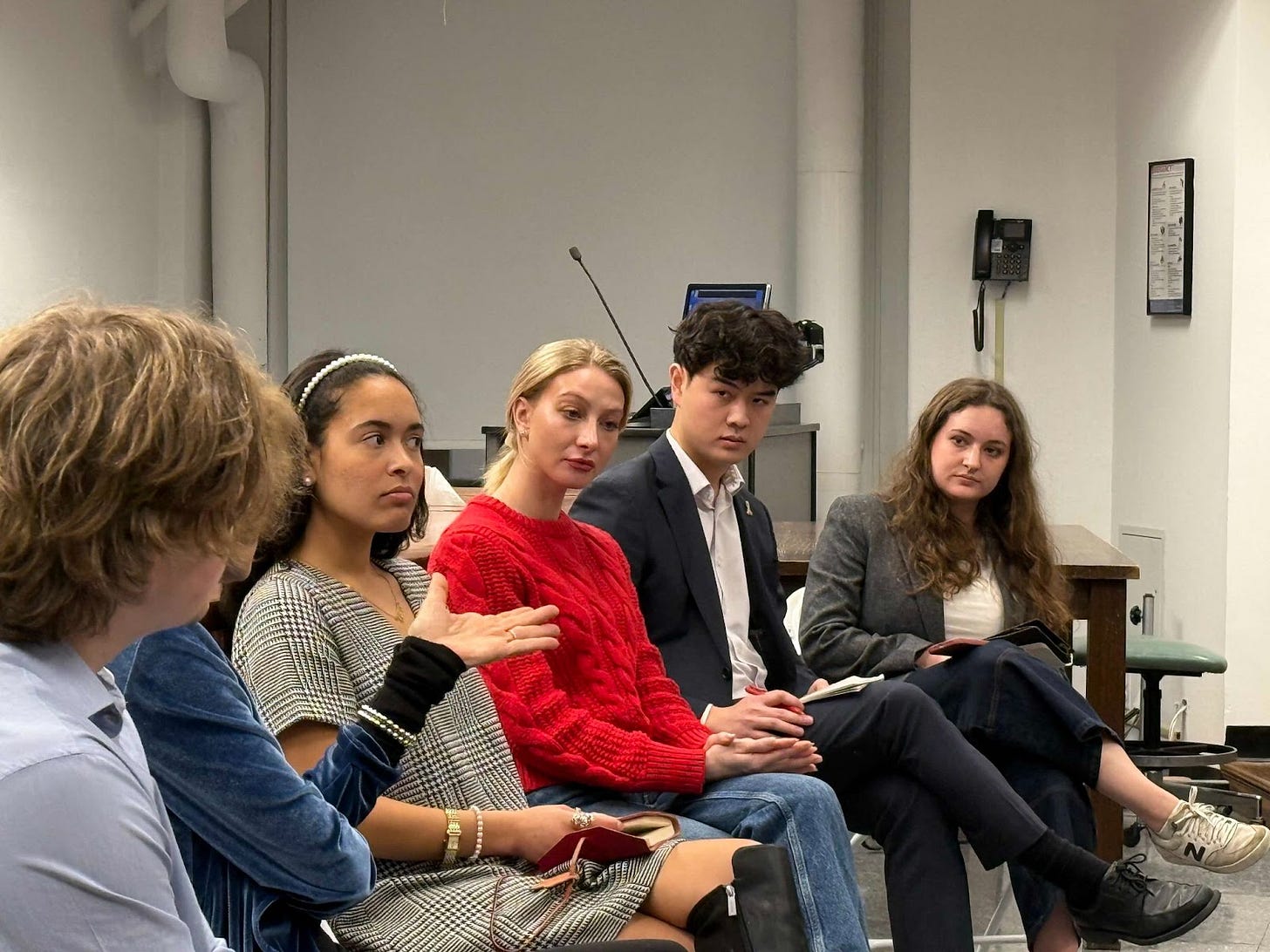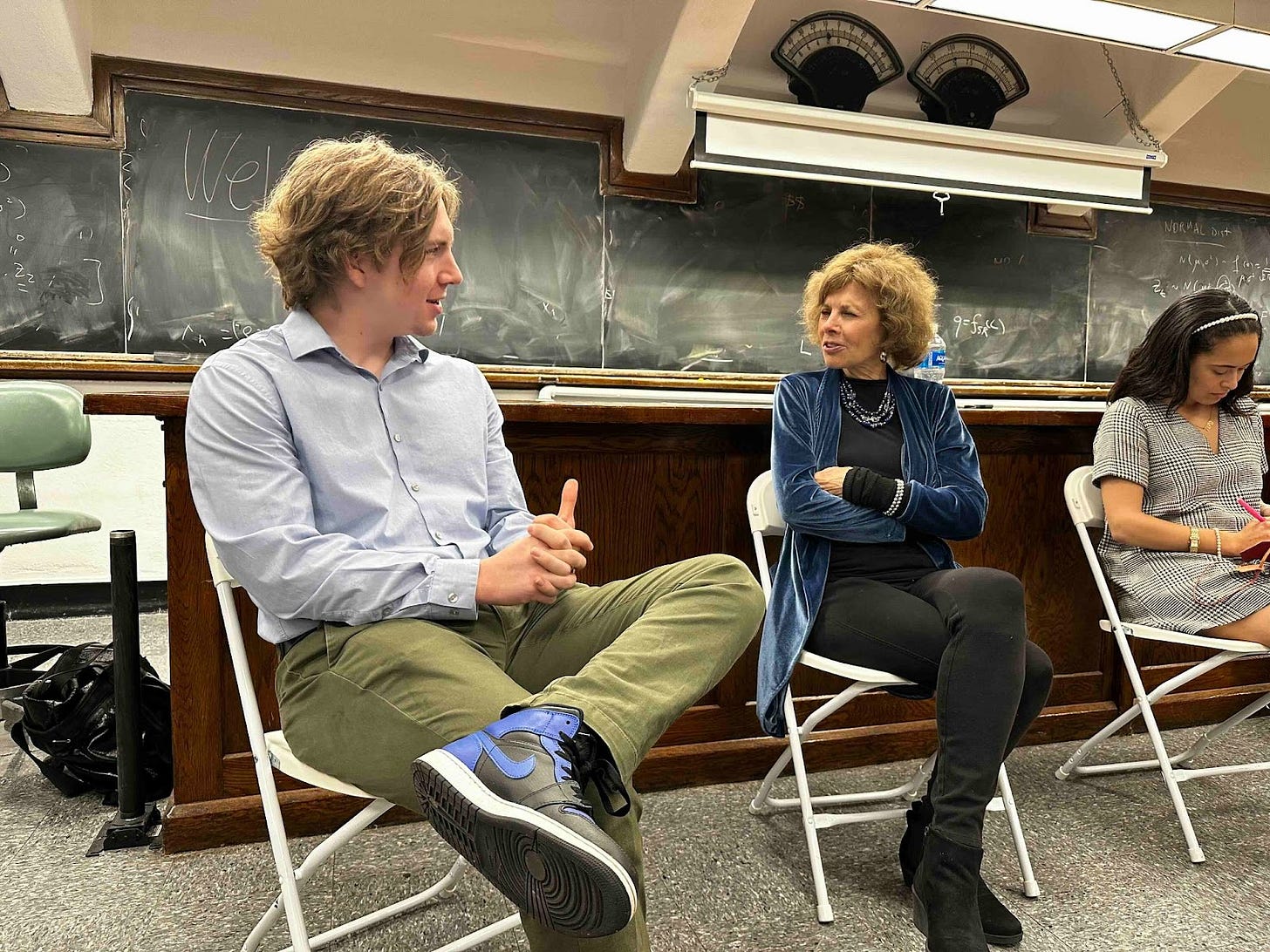Sundial Sponsors Free Speech Panel With Former ACLU President Nadine Strossen
On March 6, an ideologically diverse student panel discussed pressing issues of campus free speech with Strossen.

On March 6, a coalition of free speech-oriented campus groups hosted a panel with law professor and former American Civil Liberties Union president Nadine Strossen in Pupin Hall. At a time when debates over campus free speech are more charged than ever, Sundial and Columbia’s chapters of Bridge USA, Heterodox Academy (HxA), and the Platypus Affiliated Society came together to explore the complexities of discourse, protest, and institutional neutrality with one of America’s foremost First Amendment scholars.
Also sponsored by George Mason University’s Voices for Liberty initiative, the event featured Strossen alongside student panelists Erin Hagood GSAS ’30 (president of the Platypus Affiliated Society), Jonas Du CC ’25 (editor-in-chief of Sundial), Sydney Johnston GS ’25 (executive director of the Columbia Academic Freedom Council), Noa Fay BC ’24, SIPA ’25, and Nicholas Baum GS/JTS ’27 (director of outreach for Bridge USA and staff editor for Sundial).
After moderator Clay Smith GS ’25 (events coordinator for HxA Columbia and senior editor for Sundial) introduced the panelists, Strossen and Hagood opened the discussion by emphasizing the historical role of universities as spaces where students not only develop new ideas but also encounter opposing viewpoints.
Strossen added that academic freedom is not just about free expression but also about academic responsibility: “Education means conveying what is accepted truth according to the standards of the discipline,” she said, warning against ideological homogeneity within academic departments.

However, beyond academia’s responsibility to respect First Amendment principles lies a deeper question: What is the fundamental purpose of free speech? Panelists debated whether free speech is an end in itself—essential for self-exploration and personal identity—or whether it serves broader functions, such as advancing truth and justice.
Strossen, citing former Supreme Court Justice Louis Brandeis, later said that free speech has “both an intrinsic and an instrumental value.” It can be intrinsic, she said, because it is “a way of exploring our own identities, our own beliefs, even without communicating with anybody else.”
The panel quickly shifted focus to free speech at Columbia in light of recent protests. “Students will claim their free speech rights are being violated when they face discipline for disruptive protests, but these same students often advocate for shutting down speakers they disagree with,” Du said.
Strossen backed Du’s point and argued that there were parallels between recent events at Columbia and the Civil Rights Movement. She recalled how Martin Luther King Jr. and other demonstrators often faced violent counter-protestors, who would shout, throw bottles, and create chaos. Local officials would then cite the counter-protestors’ actions as justification to shut down demonstrations entirely.
“That’s what led the Supreme Court to coin the term heckler’s veto,” she explained. “No, you may not allow those who are disruptively and even violently protesting the speakers to disrupt the speech. It is your responsibility to prevent that from happening, to allow the speech to go forward.” Just as officials during the Civil Rights Movement tried to silence King’s movement under the guise of preventing violence, she argued that protests today that drown out other speakers are not an exercise of free speech, but rather an attempt to suppress it.
“You are not exercising free speech,” she added. “You are interfering with not only the right of the speakers to speak, but also the right of the audience to hear.”

Additionally, the panel examined the concept of institutional neutrality, questioning whether universities can truly remain impartial while making decisions that have broader social and political implications.
“The university itself must remain neutral with respect to controverted issues of public policy, with the exception of issues that directly affect the university,” Strossen said, arguing that taking political positions would adversely affect a university’s primary mission to pursue truth.
However, a student in the audience asked whether Columbia can truly uphold this principle, pointing to its financial ties to fossil fuel and defense industries. He argued that these investments amount to implicit endorsements, undermining any claims of neutrality the university makes. Strossen responded by arguing that “when we invest in companies, we're not endorsing anything about those companies. We are endorsing the economic benefit to us.”
Lastly, the panelists explored other tensions surrounding free speech. Fay questioned Strossen on the relationship between hate speech and free speech. Johnston pointed out that concepts like “microaggressions” and “intersectionality,” originally academic tools, are now sometimes used to shut down debate rather than enriching it. Baum spoke about his disappointment with his classmates’ ability to handle disagreements and tolerate different viewpoints.

“They believe themselves to be amongst the highest authority,” Baum said. “They feel as though they know a lot. And I think with that kind of impression, there's a loss of humility, a loss of being willing to respect those who disagree with your opinion.”
The event underscored the growing tensions surrounding speech, activism, and academic freedom. In the wake of recent protests and pressure from the federal government, such discussions are more critical than ever.
“In order for universities to effectively engage in truth-seeking and produce innovative ideas, students and faculty of all perspectives have to engage in open, honest, and respectful dialogue. It’s not just about the rules, it’s also about campus culture,” Smith wrote in a statement after the event. “The best way to promote a culture of free speech is to lead by example, and I can’t think of a better example than five ideologically diverse students engaging in thoughtful conversation with one of America’s most prominent civil liberties activists.”
Ms. Shen is a junior at Columbia College studying financial economics and computer science. She is a senior editor for Sundial.



Thank you, Emma Shen. (From an alumnus.)